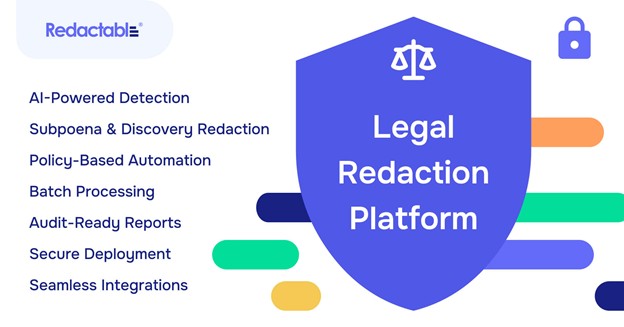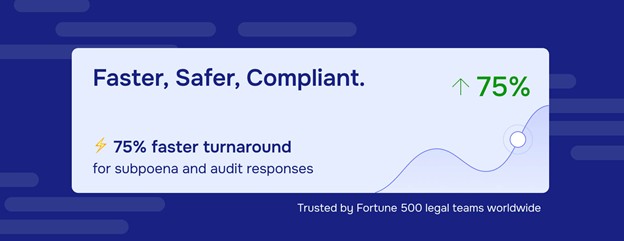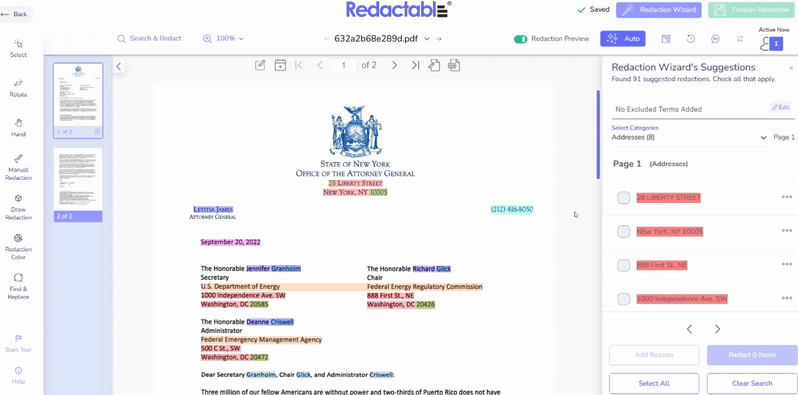Protect Confidential Data in Contracts, Compliance, and Subpoena Responses

Ensure confidentiality, consistency, and compliance — without slowing your team down
Corporate legal teams are responsible for reviewing and producing vast amounts of sensitive documents — from contracts and HR files to compliance reports and subpoena responses. Manually redacting sensitive data is not only slow but risky.
Redactable automates redaction for legal departments, helping in-house counsel and compliance teams remove confidential or privileged content accurately, consistently, and at scale.
The Challenge: Managing Data Exposure Across Legal Workflows
In-house legal teams must balance speed and accuracy when preparing materials for audits, litigation, and subpoena compliance.
Documents may contain personally identifiable information (PII), trade secrets, or attorney-client communications that must be protected before disclosure.
Manual redaction workflows often:
- Slow down response times to regulatory or subpoena requests.
- Create inconsistency across business units or regions.
- Increase the risk of accidental disclosure of privileged or sensitive data.
Redactable eliminates these risks through automated, policy-driven redaction.
How Redactable Helps Legal Departments

- AI-Powered Detection — Automatically identify and remove PII, privileged terms, contract clauses, or case identifiers.
- Subpoena & Discovery Redaction — Quickly prepare subpoena responses by auto-detecting sensitive or privileged information before production.
- Policy-Based Automation — Apply department-wide redaction policies for HR, compliance, or contract review.
- Batch Processing — Redact thousands of pages across multiple cases or departments in minutes.
- Audit-Ready Reports — Maintain an unbroken chain of custody with detailed activity logs.
- Secure Deployment — Available in the cloud or on-premise with SSO, role-based access, and encryption.
- Integrations — Connects seamlessly to Google Drive, Box, Dropbox, OneDrive, and Clio.
Why Redaction Matters for Subpoena Requests
When responding to a subpoena, organizations are legally obligated to disclose relevant documents — but they must also ensure privileged or protected information isn’t exposed. Failing to redact sensitive content can:
- Breach attorney-client privilege.
- Expose personal or financial data.
- Violate data-protection regulations.
- Undermine your organization’s legal position.
Redactable streamlines subpoena compliance by automatically detecting sensitive content across large data sets, producing consistent and defensible redactions that hold up under scrutiny.
Results That Matter

Legal departments using Redactable report:
- 75% faster turnaround for subpoena and audit responses
- Zero inadvertent disclosures across thousands of documents
- Stronger compliance posture through consistent, automated policies
A Fortune 500 in-house legal team reduced subpoena response preparation time from 5 days to 6 hours using Redactable’s automated workflows.
How It Works

- Upload contracts, HR files, compliance reports, or subpoena-related documents.
- Select department-specific redaction policies (PII, privilege, financial data, etc.).
- Review & Approve redactions with Redactable’s visual dashboard.
- Export secure, compliant PDFs or share with regulators and outside counsel.
Why Legal Teams Choose Redactable
- Built specifically for in-house legal and compliance teams.
- SOC 2 Type II and HIPAA compliant.
- Centralized policy management for consistent redactions across departments.
- Integrations with Google Drive, Box, Dropbox, OneDrive, and Clio.
- Complete audit trail for every redacted document.
When regulatory deadlines are tight and data sensitivity is high, Redactable gives legal departments the speed and accuracy they need.
Interested in learning more?
Frequently asked questions
Redactable integrates with Google Drive, Box, Dropbox, OneDrive, and Clio, making it easy to redact directly within your existing file systems.
To protect privileged, confidential, or personally identifiable information (PII) that’s not relevant to the subpoena request. Redaction ensures compliance while safeguarding privacy and legal privilege.
Yes. Built-in OCR detects and redacts text in scanned or image-based PDFs — perfect for older contracts or archived subpoena materials.
Absolutely. Redactable lets you create and apply department-specific or jurisdiction-specific rules for precise redaction.


.jpg)


